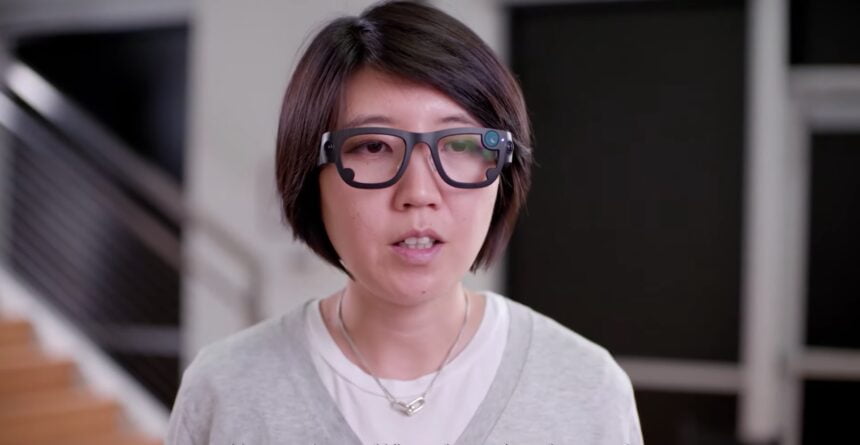Facebook’s First Pair of AR Glasses Codenamed ‘Project Nazare’
At the Connect 2021 this week, Meta (formerly Facebook) showcased the first demo of its upcoming consumer augmented reality glasses which have been codenamed Project Nazare.
The demo didn’t reveal the AR glasses themselves for a good reason. The technology required to develop the ultra-slim but powerful AR glasses is still in its infancy and the prototype hasn’t been sufficiently miniaturized. As a result, the Meta prototype for the consumer AR glasses will likely be clunkier and is not yet ready for the limelight. Zuckerberg described them as the company’s first “fully-fledged augmented reality glasses.”

However, at least the codename for the AR device is now known: Project Nazare. The augmented reality glasses have apparently been named after the coastal Portuguese city in contrast to all of Facebook’s previous project prototypes that were named after coastal areas in California.
The project aims to realize true augmented reality glasses which Zuckerberg revealed the company has been working on.
Zuckerberg narrated a short, simulated concept of a typical scene in Project Nazare where users are messaging over WhatsApp and organizing a game night. Avatars of friends can be seen popping into the field of view and the game starts.
Packing Lots of Technology in a Small Space
According to Zuckerberg, Meta (formerly Facebook) is progressively developing slim AR glasses following two approaches. On the one hand, the company is attempting to fit in as much technology as possible into a conventional glasses form factor as seen in the Ray-Ban Stories camera and audio glasses that have come out of these efforts.
On the other hand, Facebook is working on miniaturizing Augmented Reality technology to such an extent that at some point in the future, the technology will fit into glasses that are suitable for everyday usage. According to Zuckerberg, the goal with miniaturization is to have augmented reality glasses that are no more than 5mm thick or approximately 3/16 inches.
First AR Demo of Project Nazare Glasses
During a keynote and the AR demo at the Oculus 2021, Zuckerberg announced that the company was “making good progress” with the glasses even though the team still had a long way to go.
In the keynote, Zuckerberg stated that there was still “a long way to go” to realize the AR hardware’s desired form factor. The company still had a lot of technical work to be done to get the form factor and the experience right. Meta will have to fit in hologram displays, radios, projectors, cameras, custom silicon chips, batteries, sensors, and speakers that will map the world around users as well as more into the approximately 5mm thick glasses.
There is still, also, a lot of research and development to be done to get the software right, too. The software-based foundation of augmented reality devices is the AR Platform Spark AR which is Meta’s answer to Apple’s ARKit and Google’s ARCore.
In a blog post, Meta provided an update on the development status of Spark AR. Meta is working on a new interface that will enable developers to create location-based augmented reality experiences and which will also anchor realistic digital objects permanently in real locations.
New Spark AR Features
Meta is also planning to introduce hand and full-body tracking for Spark AR soon that will allow AR effects to be dynamically applied to hands and 20 different body points. The new features are being introduced to the desktop application Spark AR Studio.
For the AR novices, Meta is also working on a free iOS app known as Polar with which augmented reality effects and filters can be created via a smartphone without requiring any programming knowledge. The Polar app can also run on Spark AR and will be 100% free. The closed beta for this is set to begin before the end of the year.
Meta is also Researching Project Aria
During Connect 2021, Meta also provided an update on Project Aria. This research project was first presented at the Connect 2020.
Project Aria consists of a headset prototype packed with sensors used to find out the environmental data that AR glasses need to collect for smart functions.

Meta demoed a number of assistant-related smart home experiences which are made possible by Project Aria. The Project Aria prototype is currently only for research purposes and is not a product prototype. Accordingly, it does not have any sort of AR display installed and it is more of a stepping stone towards the development of compact augmented reality glasses that Meta appears to be shooting at.
It looks like Project Nazare is building on the Project Aria research although it isn’t apparent, yet, the level of productization that they have attained so far.
Meta’s goal for its Augmented Reality glasses is to proactively support wearers in their day-to-day life. To realize this, the integrated AI assistant has to know where users are, what they are looking at as well what they intend to do.
During the keynote at Connect 2021, Meta Research director Michael Abrash showed what the Project Aria team is currently working on; the research team has been able to automatically index every object in a model apartment according to their functions.
Thanks to eye-tracking functionality, the AR glasses can recognize what the wearer is looking at and guess the possible purpose of their next action. Consequently, through the so-called contextually aware egocentric data sets, a proactive and context-sensitive AI assistant should emerge over time.
Project Aria Partnership with BMW Announced
From late 2020, select Facebook employees have been wearing the Aria glasses for test purposes on Facebook campus, in research laboratories as well as at home. This group has since expanded to EU countries and Singapore in the course of 2021. From next month, the number of Project Aria devices in circulation will be increased to 3,000.
The company also announced Project Aria’s first partnership with industry. Meta wants to work with BMW to research how AR glasses can help with navigation and how they can be integrated into the smart devices of tomorrow.
https://virtualrealitytimes.com/2021/10/30/facebooks-first-pair-of-ar-glasses-codenamed-project-nazare/https://virtualrealitytimes.com/wp-content/uploads/2021/10/Project-Nazare-600x330.jpghttps://virtualrealitytimes.com/wp-content/uploads/2021/10/Project-Nazare-150x90.jpgAugmented RealityTechnologyAt the Connect 2021 this week, Meta (formerly Facebook) showcased the first demo of its upcoming consumer augmented reality glasses which have been codenamed Project Nazare. The demo didn’t reveal the AR glasses themselves for a good reason. The technology required to develop the ultra-slim but powerful AR glasses is...Sam OchanjiSam Ochanji[email protected]EditorVirtual Reality Times - Metaverse & VR
